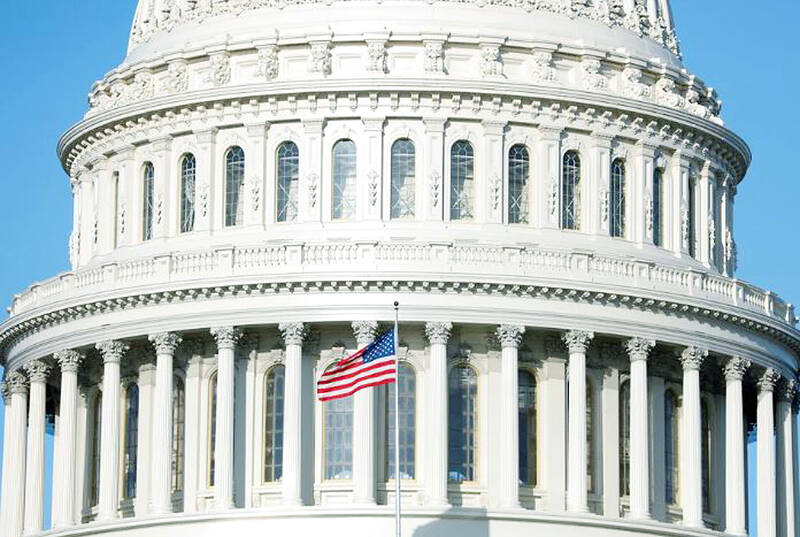The US Senate Committee on Armed Services on Friday passed a bill on the national defense policy and budget for the next fiscal year that includes provisions calling for military cooperation with Taiwan.
The US$886.3 billion budgeted under the National Defense Authorization Act (NDAA) was approved 24-1 by the committee, and has been sent to the Senate for approval.
An executive summary provided by the committee states that the US would seek to strengthen its posture in the Indo-Pacific region, in view of “long-term strategic competition with China and Russia.”

Photo: Reuters
Part of that effort includes the US establishing “a comprehensive training, advising, and institutional capacity-building program for the military forces of Taiwan,” the bill states.
It also calls for “engagement with appropriate officials of Taiwan for the purpose of expanding cooperation on military cybersecurity activities.”
The passage of the bill by the committee followed a similar pattern to corresponding legislation in the US House of Representatives, which was passed by the House Armed Services Committee 58-1 on Thursday.
According to the proposal, known as the “Chairman’s Mark,” put forth on June 12 by House Armed Services Committee Chairman Mike Rogers, the House version of the bill encourages joint military exercises between Taiwan and the US, as well as exchanges among officials on both sides.
The bill also urges the US government to support Taiwan in acquiring defense articles and services “through foreign military sales, direct commercial sales, and industrial cooperation” to help build up its asymmetric capabilities.
The bill awaits approval by the House.
Once the Senate and House approve their versions of the NDAA, they must negotiate a final bill that each body has to pass before it can be signed into law by the president.
In Taipei, Institute for National Defense and Security Research analyst Shu Hsiao-huang (舒孝煌) yesterday said that the US Congress is sending a clear signal to the White House that the US must broaden its defense cooperation with Taiwan, including joint exercises to improve interoperability.
The Pentagon has repeatedly underscored interoperability of command and control as a key capability that the US and allied forces must obtain in joint exercises, he said, adding that this would significantly augment the combat performance of a military coalition.
The US conducts joint exercises with South Korea, Japan, the Philippines and Indonesia, which comprise the entirety of the first island chain minus Taiwan, leaving a gap in capabilities, he said.
Current military exercises carried out by Taiwan and the US do not qualify as true joint exercises, he said.
Taiwan-US defense cooperation is conducted too sporadically and does not include senior commanders, which means the methods of waging modern war on a large scale and fresh ideas from the US cannot be learned, Shu said.

AIR SUPPORT: The Ministry of National Defense thanked the US for the delivery, adding that it was an indicator of the White House’s commitment to the Taiwan Relations Act Deputy Minister of National Defense Po Horng-huei (柏鴻輝) and Representative to the US Alexander Yui on Friday attended a delivery ceremony for the first of Taiwan’s long-awaited 66 F-16C/D Block 70 jets at a Lockheed Martin Corp factory in Greenville, South Carolina. “We are so proud to be the global home of the F-16 and to support Taiwan’s air defense capabilities,” US Representative William Timmons wrote on X, alongside a photograph of Taiwanese and US officials at the event. The F-16C/D Block 70 jets Taiwan ordered have the same capabilities as aircraft that had been upgraded to F-16Vs. The batch of Lockheed Martin

GRIDLOCK: The National Fire Agency’s Special Search and Rescue team is on standby to travel to the countries to help out with the rescue effort A powerful earthquake rocked Myanmar and neighboring Thailand yesterday, killing at least three people in Bangkok and burying dozens when a high-rise building under construction collapsed. Footage shared on social media from Myanmar’s second-largest city showed widespread destruction, raising fears that many were trapped under the rubble or killed. The magnitude 7.7 earthquake, with an epicenter near Mandalay in Myanmar, struck at midday and was followed by a strong magnitude 6.4 aftershock. The extent of death, injury and destruction — especially in Myanmar, which is embroiled in a civil war and where information is tightly controlled at the best of times —

Taiwan was ranked the fourth-safest country in the world with a score of 82.9, trailing only Andorra, the United Arab Emirates and Qatar in Numbeo’s Safety Index by Country report. Taiwan’s score improved by 0.1 points compared with last year’s mid-year report, which had Taiwan fourth with a score of 82.8. However, both scores were lower than in last year’s first review, when Taiwan scored 83.3, and are a long way from when Taiwan was named the second-safest country in the world in 2021, scoring 84.8. Taiwan ranked higher than Singapore in ninth with a score of 77.4 and Japan in 10th with

SECURITY RISK: If there is a conflict between China and Taiwan, ‘there would likely be significant consequences to global economic and security interests,’ it said China remains the top military and cyber threat to the US and continues to make progress on capabilities to seize Taiwan, a report by US intelligence agencies said on Tuesday. The report provides an overview of the “collective insights” of top US intelligence agencies about the security threats to the US posed by foreign nations and criminal organizations. In its Annual Threat Assessment, the agencies divided threats facing the US into two broad categories, “nonstate transnational criminals and terrorists” and “major state actors,” with China, Russia, Iran and North Korea named. Of those countries, “China presents the most comprehensive and robust military threat